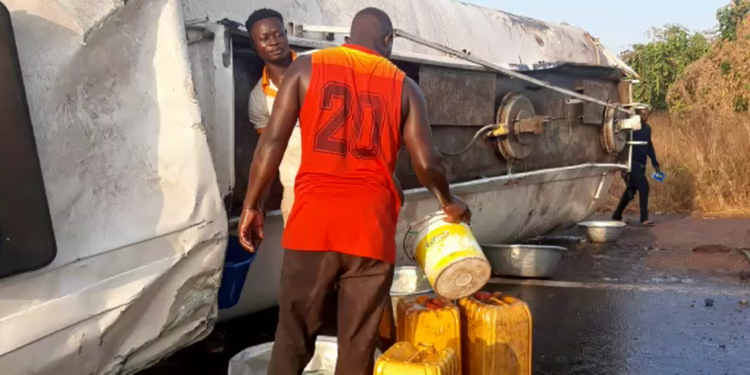BY MARTHA LEAH NANGALAMA
The sight of a fuel truck involved in an accident may seem like an opportunity for some, especially in Uganda, where desperation can drive dangerous decisions. However, siphoning fuel from these trucks is not only reckless but a potentially deadly action that demands immediate attention. This practice goes far beyond theft—it endangers lives, damages the environment, and overwhelms public safety systems.
Fuel is a highly flammable and explosive substance. Trucks transporting petrol or diesel carry enormous volumes of fuel, which can ignite with the slightest spark. Whether from a cigarette, a phone, or even static electricity, a single flame can cause catastrophic explosions. In recent years, Uganda has witnessed several tragic incidents where people have lost their lives while attempting to siphon fuel. One of the most notorious disasters occurred on July 8, 2013, in Namungoona, a suburb of Kampala. A fuel tanker overturned, and scores of people rushed to siphon fuel. Minutes later, an explosion ripped through the scene, killing over 30 people instantly. The inferno not only consumed those stealing fuel but also engulfed nearby homes, leaving dozens of families shattered.
This isn’t an isolated event. On October 22, 2019, in Kyambura, Rubirizi District, a fuel tanker lost control and crashed, causing a devastating fire that killed more than 20 people. Many of those who died were locals who had hurried to the scene with containers, hoping to take advantage of the fuel spilling from the wreckage. The explosion obliterated any chance of survival, leaving nothing but charred remains and grief for the families of the victims. Even more recently, in February 2022, a fuel truck overturned in Kyambogo along the Jinja-Kampala highway. Bystanders rushed to collect fuel, but when the tank ruptured, an explosion followed. Although casualties were less severe than in earlier disasters, several people were hospitalized with critical injuries, a stark reminder that death and destruction often follow such reckless behavior.
Health risks associated with siphoning fuel from accident sites are enormous. The fumes from petrol are highly toxic, and prolonged exposure can lead to respiratory problems, dizziness, nausea, and even long-term conditions like lung damage or cancer. Those inhaling these toxic fumes without protection risk serious, lifelong health issues. Yet, in the desperation to scoop “free” fuel, most people overlook this danger, unaware of the silent killer they’re inviting into their lungs.
Beyond the immediate risks to human life, the environmental consequences of these accidents are catastrophic. Fuel spills into the surrounding land and water sources, contaminating them with toxic chemicals. In a country like Uganda, where agriculture is the backbone of rural economies, these spills can destroy farmlands, pollute rivers, and threaten the survival of wildlife. The damage is not just short-term; it can take years, even decades, for ecosystems to recover from a fuel spill. Communities surrounding these disaster sites often face long-lasting economic devastation, with poisoned soil and contaminated water rendering the land useless for agriculture or livestock.
Additionally, there are significant legal and moral consequences for siphoning fuel. This activity is outright theft and puts one on the wrong side of the law. In Uganda, authorities have intensified efforts to arrest and prosecute anyone caught stealing fuel from accident sites. Moreover, interfering with an accident scene hampers the work of emergency responders, who may be trying to prevent further explosions or secure the area. The delay caused by a swarm of people siphoning fuel can mean the difference between life and death for those injured in the crash.
To stop this deadly practice, there must be a concerted effort to educate the public about the dangers of siphoning fuel. Community leaders, media, and government officials must work together to spread awareness, using these tragedies as a deterrent. The lesson is simple but vital: siphoning fuel from an accident site is a death sentence waiting to happen. Whether through a fire, explosion, or the poisonous fumes you inhale, the price you pay for “free” fuel could be your life.
Fuel is not just a commodity; it’s a potential killer when mishandled. Ugandans must be made to understand that no amount of fuel is worth the price of a life, no matter how tempting it may seem in the moment.







Discussion about this post